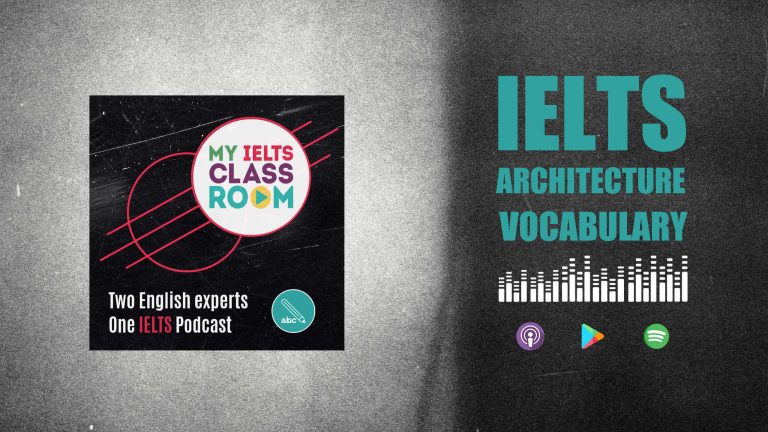
IELTS Architecture Vocabulary
We all have topics that we are familiar with in IELTS. But, there are also other topics which we may meet with a blank mind. So, what can you do to fill in your knowledge gaps? In today’s episode Nick and I will look at a difficult topic for us – housing. We will start by covering some fundamental IELTS architecture vocabulary, and then show you how you can utilise Google to find essay ideas.
Plus, this will give us a chance to see indirect vocabulary learning in action. Hopefully, by the end of the lesson, you will understand why this is a much better method than searching for model essays.
Below, you can find a summary of the episode, which includes all of the links to useful materials and the times of each part of the discussion (so you can go directly to the part you want to listen to) 🚀
- Subscribe to My IELTS Classroom podcast on Apple podcasts here
- Subscribe to My IELTS Classroom on Google podcasts here
- Become a Patreon to gain access to extra BONUS episodes here

IELTS Architecture Essay Topics
In today’s episode we want to look at the topic of housing or architecture. I’m not talking about the well-used topic of city life, with the classic IELTS questions about overcrowding, the move from the countryside, or not knowing your neighbours, but rather the recent trend of essays topics that ask you to discuss the importance of building styles or architecture.
Some people think that new houses should be built in the same style as older houses in an area. Others believe that local councils should allow people to choose different designs for their houses. Discuss both views and give your opinion.
When designing a building, the most important thing for architects to consider is the intended use of the building rather than its outward appearance. To what extent do you agree or disagree?
Some cities create extra housing by building tall buildings. Other cities do this by building on wide areas of land. Which do you think is the best solution to the problem of housing?
This is just a small selection of the essays that appeared in 2021 with this theme (you can find more by looking at our 2021 archive of reported questions), but it is probably enough for you to understand that these questions are tricky for two reasons:
- They require a specific set of vocabulary (which many students may not have)
- They are an unusual topic, so you may not have any instant ideas that you can use as the basis for your arguments
IELTS Architecture Vocabulary
Let’s start then by looking at some foundational topic-specific vocabulary that you should have in your lexis tool box to tackle speaking or writing on the topic of housing design.
| Category | Lexis |
|---|---|
| Types of built up areas | city / town / village / rural area / urban area |
| Parts of a city or town | district / suburbs / outskirts / city centre / centre business district |
| What makes cities work | infrastructure / amenities |
| Types of house / building | terraced / detached / flats / apartment block / high-rise / sky-scraper / town house / bungalow |
| Parts of a house | roof / façade / window frames / chimney / walls / balcony / outdoor space (garden / courtyard) |
| Building Materials | brick / concrete / stone / glass / metal / steel / wood / roof tiles / tatami |
| Building Styles and features | modern / Gothic / traditional / Victorian / period features / fireplace / high ceilings / painted / 5-storey building / local materials / decorative eaves / columns / wooded beams |
| People | residents / citizens / city dwellers / architect / city planner |
What I realised when creating this chart was that the lexis you will need to successfully describe the houses in your built environment is going to depend very much on where you live in the world. The average British home is very different to one in China, Saudi Arabia, or even the US.
Therefore, this is not an exhaustive list of basic lexis!
Make sure that you have the lexis you need to talk about housing in your area by translating any missing words from your language into English.

How to find ideas for IELTS Architecture Topics
I know that it can be frustrating if you are a doctor and you have to write an essay on architecture, but IELTS is designed to test your understanding and application of English in general, not medical English. 90% of the topics in IELTS require no specialist knowledge (we all know that sugar makes us fat or the benefits of free education thanks to our common sense), but there are some topics that you may not have a clear idea about. At least, not enough of an idea to write a coherent 300 word essay in 40 minutes. For those essays, it can be a good idea to spend half an hour or so reading about the topic online. However, let me be clear
I am not talking about searching for model IELTS essays!
I cannot tell you enough how poor 99% of “model essays” are. Almost all that claim to be Band 8.0 are Band 6.0 and very few have genuinely good ideas. No, I am taking about Googling for high-quality articles that will give you a good sense of the generally held views on a given topic. Is this time-consuming? Yes, but remember, the more you can engage with a topic, the more likely that you are going to absorb the information and be able to recall it in an exam.
There are two ways that you can search for information: by general topic, or by specific essay question. Let’s start with the former!
Looking for a school that offers world class lessons from ex-examiners delivered straight to your home? Then find out more about My IELTS Classroom here

Explore a general IELTS topic
I Googled “why architecture is important” and these are the first 4 articles that appeared in my search results.
-
- HMC Architects – https://hmcarchitects.com/news/how-does-architecture-impact-society-a-high-level-look-2019-10-18/
- Study Architecture – https://studyarchitecture.com/blog/architecture-news/why-architecture-is-important/
- Designblendz – https://www.designblendz.com/blog/4-reasons-why-good-architecture-is-important
- Impoff – https://impoff.com/importance-of-architecture/
Usually those articles that appear at the top will be the most relevant, but not always. I would discount any article that are paid adverts (although you may not have many for IELTS topics!) and results from discussion sites such as Quora or Reddit as it will be hard to monitor the relevance or quality of the information.
Once you have found 3 or 4 articles that look relevant, open them and scan the contents to understand their relevancy and difficulty. A good indication that a site will be the right level is if it contains headings and relatively short paragraphs. In fact, why not open those 4 articles now and decide which is the easiest to read and which is the most difficult (we will tell you in the episode what we think).
Active Reading
It is important when you read that you do so actively. This means that as you are looking through the articles, you should be thinking if the information is relevant or not relevant, or if it might be of use in an argument in a future essay. Again, go back and read through the articles above and make notes of any main ideas. You can either summarise the text or copy and paste it. You may also want to highlight key phrases or concepts. Let me do the first one to help you:
- architecture is a representation of society and of our culture. It shows how we see ourselves, as well as how we see the world.
- The style of buildings was originally shaped by the climate of a particular location, what materials were readily available, as well as the values of the society building them.
- Architecture not only affects society on a high level, but it can have a profound impact on its occupants. Everything from the layout of the space to the material finishes can contribute towards occupant health, mood, and productivity. It’s been shown that people who work in well-designed spaces take less sick leave, are more focused, and generally contribute more to their company.
- Sterile, concrete landscapes and unimaginative buildings cause higher levels of stress.
- Future questions: how do we address the growing differentiation between economically diverse communities within cities? How do we combat the continuous increase of the world’s population, and make sure that our cities retain our inherent desire to have a connection to the natural environment?
Find ideas for a specific IELTS essay question
This is where you are going to have to resist the urge to search for model essays! Trust me – if you can stick to genuine resources it is going to be far more effective. Why? Well, not only can you be 100% sure that your ideas are “correct”, but you can also harvest some fantastic topic specific lexis along the way.
Seriously, the vocabulary you learn in English textbooks (even ones written specifically for IELTS) cannot compare to the topic-specific vocabulary and collocations you find when reading original material. Don’t believe me? Well, see for yourself. In the episode Nick and I research ideas for this essay question:
Some cities create extra housing by building tall buildings. Other cities do this by building on wide areas of land. Which do you think is the best solution to the problem of housing?
Why don’t you do it now by Googling “why are tall buildings better” and spending 10 minutes copying and pasting the advantages and disadvantages of tall buildings. Focus first on ideas (which you can check with us in the episode) and then go back and have at the look words you have copied and pasted. Can you see any words and phrases that could be useful in other essays about the built environment?

Again, here is an example to help you. This is a section of text I copied and pasted for an advantage of tall buildings. Look at all those lovely high-level phrases that you would probably never find in a textbook! Even better, they are being used in context, so you can see how they are used naturally in a sentence.
More room for workers and residents. In line with rising population density, and advancements in engineering, height limits around the world are being revisited and revised to maximise space for commercial and residential growth. They provide the opportunity to control urban sprawl with their relatively small footprint.
I know that studying for IELTS can be time-consuming, but if you need a very high-score and want to improve your ability to find good ideas and use high-level lexis, then using original material can be a great way to improve your level. After all, even if you know all the theory about finding ideas for essays, you still have to have some general knowledge of the topic to be able to do so!
